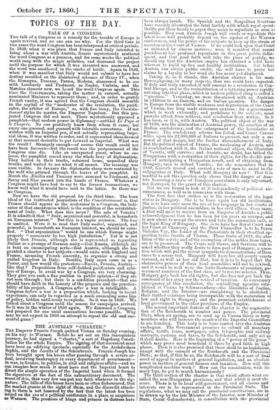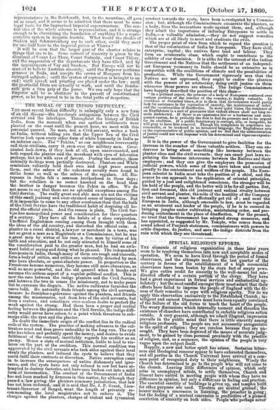THE AUSTRIAN "CHARTER."
Tale Emperor Francis Joseph quitted Vienna on Sunday evening, on his way. to Warsaw. Before he eet out on this inauspicious journey, he had signed a "charter," a sort of Hapsburg Consti- tution for the-whole Empire. The signing of that document must have been.= edifying spectacle especiaRy for the Archduchess Sophia and the Jiunits of the gehOnbrunn. Francis Joseph has been brought upon his knees after passing through a severe or- deal, involving bankruptcy in every department of government— in war, in finance, in polities, in civil and religious affairs—and we can imagine how much it must have cost the Imperial heart to direct the simple operation of the Imperial hand when it formed the signature at the foot of this extraordinary document The worst of it is, that very few can put any faith whatever in the sig- nature. The bills of this house have been so often dishonoured, that the market groans at the sight of them, and the discredit attach- ing to them is not lessened by the fact that the latest has been issued on the eve of a political conference in a place so suspicious as Warsaw. The promises of kings and princes in distress have
been always lavish. The Spanish and the Neapolitan Bourbons have recently illustrated the fatal facility with which royal spend- thrifts put their hands to paper they mean to repudiate as soon as possible. How soon Francis Joseph will evade or repudiate this latest issue will probably depend on the upshot of the Warsaw conferences, and the power of his subjects to keep up the strain of coercion on the Court of Vienna. If we could look upon that Court as animated by sincere motives ; were it manifest that recent punishment has produced repentance in this great public delin- quent, and that good faith will take the place of perfidy, we should say that the Austrian empire has obtained a solid basis whereon to build up free and healthy institutions. But before Austria can obtain public credit, she will have to prove her claims by a loyalty to her word she has never yet displayed.
Taking it, as it stands, this Austrian charter is far more thoroughgoing, in many respects, than one could have expected. If duly and truly executed, it will amount to a revolution in Cen- tral Europe, and to the reconstitution of a tottering power rapidly entering into that phase, which in modern political slang is called a "question." Yesterday, we were threatened with an Austrian in addition to an Eastern, and an Italian question. The danger to Europe from the visible weakness and degradation of the Court of Vienna, has long made statesmen anxious ; for a government which is weak externally, and perfidious to its subjects, must provoke attack from without, and revolution from within. So it has been, so it is, with Austria. The political object of the war of 1859, was the diminution of Austrian power, tho creation of an Italian confederacy, and the enlargement of 'the boundaries of France. The confederacy scheme has failed, and Count Cavour relies upon his 22,000,000 of Italians to prevent, not only a re- newal of that design, but the further dismemberment of Italy-. But the political object of France, the weakening of Austria, and in combination with it, the Italian national object, the liberation of Venetia, still survive ; and Austria, no doubt, has bribed the Hungarians with a restoration of their rights, for the double pur- pose of anticipating a Hungarian revolt, and of obtaining from. Hungary, men to defend Venetia ; for she remembers that in 1849, Kossuth moved and carried a vote of men to assist in the subjugation of Italy. What will Hungary do now ? That it is needful to ask this question only shows that the danger of Aus- tria becoming a cause of European convulsion is only adjourned, not destroyed, by the grant of this charter. But we are bound to look at it independently of political cir- cumstances' as well as in connexion with them. The first fact that strikes us is the restoration of the legal status in Hungary. She is to have again her old institutions, She is to have once more the use of her language in her courts of justice, in her political assemblies, in her civil offices. Once more, a Diet will meet to receive from an Emperor of Austria a public acknowledgment that he has been for ten years an usurper, and is now about to accept the crown and take the coronation oath, as the legal King of Hungary. She is to have her Royal Court and her Court of Chancery, and the First Chancellor is to be Baron Nicholas Vey, the leader of the Protestants in their steadfast op- position to the Jesuits of Vienna. Those fruits of 1848, the abo- lition of the corree and of the exemption of the nobles from taxes, are to be preserved. The Croats and Slaves, and Servians will be asked whether they really desire to form part of Hungary,- a ques- tion which will put the recent sympathetic demonstrations of these races to a severe test. Hungary will have her old county courts restored, as well as her old Diet, but it is to be hoped that the- obstructive powers of these local assemblies will not be revived,. and it would be well were the lords-lieutenants of counties, go- vernment nominees of the first class, not to receive salaries. Thus,
Hungary gets back her old rights, but she does not get back the command of her army nor the control of taxation. As a necessary consequence of this revolution, the centralizing agencies esta-
blished at Vienna by Schwarzenberg—the Ministries of Justice, Religion, and the Interior—are straightway to be abolished ; their further existence being incompatible with the restoration of law and right in Hungary., and the promised establishment of local government in the other provinces of the Empire.
The second important feature of the charter is the augmenta- tion of the Reichsrath in number and power. The provincial Diets, when set agoing, are to send up to Vienna thirty or forty members who will increase the number of the Imperial Councillors to one hundred. This body is to have control over the Austrian exchequer. The Government promises to submit all monetary affairs, tariffs loans, mortgages, sales, telegraphic and railway contracts, customs and taxes, to the Reichsrath, and only act as it shall decide. Here is the beginning of a "power of thepurse " i which may prove most beneficial if there be good faith n high places. Then it is also promised that there shall be no legislation, except with the consent of the Reichsrath and the Provincial Diets ; so that, if this be so, the Reichsrath will be a sort of final court of appeal in matters of general legislation, and an absolute power in matters of general finance and taxation. How will this complicated machine work ? How can the constitution, with its many legs, be got to march harmoniousl3r The third section of the charter is that which affects what are galled the non-Hungarian provinces, and that which is most ob- scure. There is to be local self-government, and all classes and interests are to be represented in the Provincial Diets. The regulations, what we may call the provincial constitutions, are to be drawn up by the late 'Minister of the Interior, now Minister of State, Count Golonchowski, in consultation with the provincial
representatives in the Reichsrath, bat, in the meantime, all goes on as usual, and it seems to be admitted that there must be Some legal basis for the improvised imperial 'superstructure. The cen- tral idea of the whole scheme is representation, and it is strange enough to he ehronieling the foundation of anything like a repre- imitative system in despotic Austria. What would the shades of Atadion and Sehwarzenberg say to each other, could they meet for one-half hour in the imperial palace at Vienna ? ' It will be seen that the larger part of the charter relates to things that are to be. Some earnest of sincerity is given by the dismissal of Count Leo Thun' Count Nadasdy, and Count Thierv, rilthe suppression of the departments they have tilled, arid by We- appointments of Val- and Szechen. But Europe will not be tiOntnt to belieVe Austrian sincerity, until the EMTerorperforms Pimence in Blida, and accepts the crown of Hungary from his outraged subjects; until the systeni of repression is 'brought to an elidt until' speech and. printing are pla'..ed under the law ; until tri'proVinefil Diets are actually at work, and until the Reichs- lh-gitS a firm grip of the purse. We can only hope that the ,peror will be as obstinate in the pursuit of constitutional trer, as he has proved to be in the fatal paths of despotism.



























 Previous page
Previous page